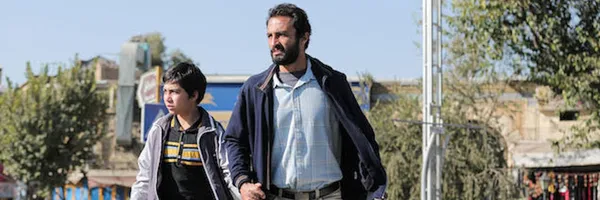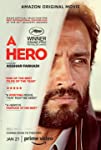Eye For Film >> Movies >> A Hero (2021) Film Review
A Hero
Reviewed by: Jennie Kermode

In a world where the main stories on the news get darker every day, many people look forward to the ‘and finally’ moment when they will be comforted with a funny animal story or an illustration of some individual act of human kindness. It’s no accident that such stories are also popular currency on social media – where, indeed, some people make significant profits from repackaging and promoting them. But as others find optimism threatening or distasteful, and delight in bringing it down, the heroes of such tales often suffer a backlash. What’s more, the stories themselves, once the presenter’s smile, the upbeat narration and the cheerful music are stripped away, often turn out to be lacking in substance, or not to be seriously indicative of virtue at all.
Rahim (Amir Jadidi) first comes to public attention when he seeks out the owner of a bag of gold coins which he found at a bus stop, so that he can return them. “Where in the world are people celebrated for not doing wrong?” asks Bahram (Mohsen Tanabandeh), a man to whom Rahim owes significant debts, who has a clearer understanding of ethics than anyone else in the story yet falls short when it comes to understanding human nature. It’s not that Rahim deserves to be celebrated. Indeed, this ex-com’s first thought was to sell the coins, before he realised that he might gain more by using them to rehabilitate himself. Rather, what Bahram misses is that the public needs a hero; that it is crying out for a hero to believe in, however feeble his apparent good deed. Rahim quickly finds himself becoming the poster boy for a better world – but that backlash is coming, and when it does, it will hit hard.

As a filmmaker, Asghar Farhadi specialises in teasing out the complex moral quandaries experienced by ordinary people in the course of day to day life. Like all his central protagonists – one might hesitate to call them heroes – Rahim is a deeply flawed, troubled individual. Rather than start with a sympathetic man and let us observe the process of him being corrupted, Farhadi presents us with a man whose arc centres of coming to recognise his moral failings as detrimental to himself and those he loves, and on showing the audience how such a man might ultimately find something heroic within himself, even if it emerges in a much less obvious way.
The issues at play here are more than human. They are systemic: Rahim, Bahram and every other character here is beset by forces which seem so intractable that their decisions are not wholly their own. Whilst it is Rahim whose choices seem on the surface to be most dynamic, most human, as he strives to change his destiny, Bahram’s strong belief in traditional moral values like telling the truth, honouring one’s debts and doing good for its own sake is at odds with the zeitgeist. Farhadi cleverly structures the film so as to invite viewers, too, to see Bahram as a villain, only slowly (if at all) coming to recognise the strength of his arguments. As viewers are always the heroes of their own stories, putting them in a position where they might realise they have rooted for the wrong side is a bold move.
This does not mean that Rahim becomes unsympathetic. He’s harder to like as he begins to flail against the prospect of failure, and it’s harder to root for him as he exploits his girlfriend, his sister and his son (who is rendered additionally vulnerable by a crippling stutter) to try and salvage the situation. Farhadi uses simple narrative tricks to keep us with him, however. There’s that simple human longing for the increasing awkwardness of everything to go away, so that everything can go back to an acceptable normality (however corrupt that might be). It’s also hard not to relate to Rahim’s dream of clearing his debts and starting a new life with his girlfriend, which will doubtless reflect the personal experiences of many viewers around the world; and Farhadi implies that the seed of evil here lies in a social system which forces many people to take on debts they cannot pay.
Whilst the men are foregrounded, the women here are far from invisible, and we see the strain placed on them by their efforts to do right by the men as they recognise the shaky moral ground on which they are standing. meanwhile, other questions gradually bubble to the surface, sometimes going unanswered. Why was a bag of gold coins left at a bus stop in the first place? Was it really an accident? Is the woman who comes forward to claim it really its owner? The drama we see unfold is only one part of something much bigger.
Beautifully photographed as always, with a colour palette whose soft, shifting hues reflect its moral and narrative ambiguity, A Hero is one of Farhadi’s finest works. Though it may at first seem too busy, replete with distractions, he has a habit of letting these fall away at critical moments so that we suddenly see simple matters in very different ways. There is much here that might be considered incidental; none of it is accidental. The performances are carefully balanced so that no one overwhelms the others, though all are impressive. Overall, the film is as gripping as it is uncomfortable to watch. Though it addresses a subject which viewers may feel they understand well, it’s full of sharp insights; it is also, at times, unexpectedly moving.
Reviewed on: 08 Jan 2022

















